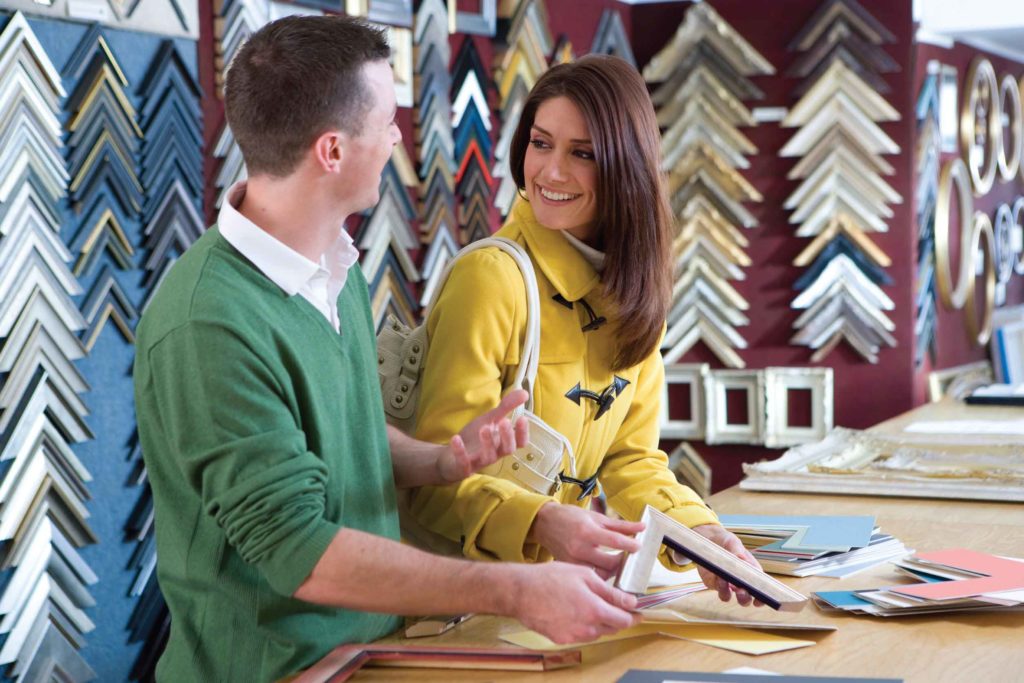Knowing how to approach customers regarding premium features is tricky, especially in the custom framing business. Consumers frequently have those moments of sticker shock when getting estimates on framing their pieces, which leads framers to be conscious of “over-selling.”
At the same time, you know they’ve put their piece in your hands, and, as an expert, you have a responsibility to them. When it comes to glass, some custom framers have told us they are hesitant to talk with their customers about value added glazing, like Museum Glass®.
During focus groups we recently conducted with consumers who have custom framed, we shared some of the statements custom framers have made about why they are less likely to offer Museum Glass.
- “My customers cannot afford Museum Glass. They typically have a tight budget, so I do not offer it.”
- “I do not always show my customers their glass options. I make a recommendation based on what I think should go with their piece, and they usually just go with what I recommend.”
- “When I do not think their piece has monetary or sentimental value, I don’t show them Museum Glass. I just don’t think they need it.”
If any of these sound familiar, you will probably be interested to know what types of reactions consumers had to those statements. Following are some of the responses the focus group participants gave upon hearing them.
- “Why wouldn’t you just let the customer decide (if their piece is worth it)?”
- “I wouldn’t prejudge and just assume they can’t afford it.”
- “Now that I know (about Museum Glass), if I walked into a frame shop, and they only recommended regular glass, I’d be offended.”
Many of the participants recalled that they weren’t given glass options during their custom framing experience and the participants were surprised and disappointed to hear the potential reasons why, especially considering the features upgraded glazing offers. If framers are making these statements out of concern for their customers, it may be doing their customers and themselves a disservice.
This would be comparable to going to a restaurant and only being offered items that the server thought you could afford, not the whole menu. This is not just poor customer service, but a faulty business philosophy. The restaurant may disappoint their customers and may lose out on potential sales, both of which will undermine the future success of the business.
Ways to make talking about glazing options easier
If you are uncomfortable with bringing glass into the conversation due to the expense, below are four ways you can make it easier to talk about glazing options.
- Listen to your customers. Listen for words and phrases like, “special,” “valuable,” “means a lot to me/my family,” or “something I want to keep for a long time/hand down to my children.” If you hear any of these, you can more easily communicate the benefits of Museum Glass in the context of their wants and needs. Talking about upgraded glazing will feel more natural when the customer’s priorities take the lead.
- Put the counter display in your customer’s hands. Several of our focus group participants said, “Seeing is believing,” when they viewed the Museum Glass display. Those who were unfamiliar with Museum Glass were shocked when they saw the clarity. If your customers can witness their options with their own eyes, the additional expense will make more sense to them, even to the point of being willing to purchase. Research shows that consumers will upgrade to Museum Glass more than one-third of the time if simply given a choice.
- Check out our training video on presenting glazing options. Visit the Frameworks for Success section of the Tru Vue website at: www.truvue2023prd.wpengine.com/Custom Framers. This video walks through a simple process for using the display to educate customers about their glass choices.
- Set aside your options and spending priorities. As reported in the article “How Consumer Insights Can Inform the Unique Selling Proposition”, customers bring pieces in for custom framing when something is “special” to them. Yet, this is a very subjective term. A piece might be meaningful to a customer for any number of reasons, some which you may not be aware. Focus group participants were unanimous in their opinion that it is the customer’s place — not the framer’s — to decide if Museum Glass is worth the expense. It’s perfectly okay if they say “not this time”, they are now educated for when they have a piece they wish to preserve and protect.
Share this Article:
This article is intended for educational purposes only and does not replace independent professional judgment. Statements of fact and opinions expressed are those of the author(s) individually and, unless expressly stated to the contrary, are not the opinion or position of Tru Vue or its employees. Tru Vue does not endorse or approve, and assumes no responsibility for, the content, accuracy or completeness of the information presented.
